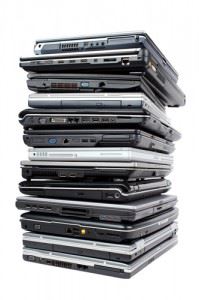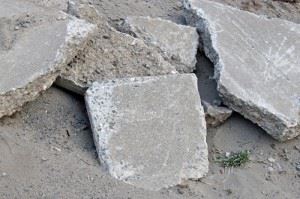Electronic waste (a.k.a., e waste) is a term used so often that its meaning has paradoxically become a little vague.
Part of the reason that electronic waste is hard to define is that this kind of waste comes from many sources – computers, stereos, copiers and the list goes on – and the fact that e waste can include so many consumer electronics at the end of their useful life.
Electronic Waste? Useful life?
A lot of these terms entered the public lexicon around the time that quick technological change and high electronics’ turnover started to become commonplace around 2000.
Pieces of legislation in California like the Electronic Waste Recycling Act of 2003 also brought the issue of e waste and responsible disposal/reuse to popular attention. The fact that tech change and electronics’ turnover were becoming a yearly thing for many people meant that something needed to change in how e waste was dealt with.
So where does this idea of an electronic’s “useful life” come into play? An electronic’s useful life ties into tech turnover in that the quicker tech change happens the more likely consumers are to adopt newer, better electronics.
An electronic’s useful life, or life cycle, is getting shorter as better technologies come along and steal the spotlight from yesteryear’s products. Some electronics have longer life expectancies than others.
Flat screen televisions have a relatively long life cycle at just over seven years whereas laptops and Smartphones have a significantly shorter life cycle. This is all to say that more consumer electronics are reaching landfills as their life cycle expires.
Getting more of these used electronics into recycling programs or embracing responsible disposal is, therefore, a huge step of personal responsibility and environmental stewardship for anyone to take.
Benefits of Responsible E waste Disposal
A piece of electronics that’s reached the end of its useful cycle might be lying around your home right now.
This might sound like a boring observation but it’s a potential issue for two reasons – recycling that product instead of letting it slowly decay can lead to less overall waste and, secondly, removing that product from your home could lower your chances of being exposed to toxic waste. Let’s explore the second point for a moment.
Electronics that have reached the end of their life cycle often contain toxic materials like mercury and lead that need to be responsibly disposed of or recycled.
It’s that simple: letting e waste fester in homes, offices or factories results in even more e-waste, as materials that could be recycled aren’t, and lingering e-waste also results in potential exposure to toxic materials.
Reuse and Donation Vs. Disposal Vs. Recycling
What you do with your e waste is, of course, up to you. There are also different kinds of benefits and considerations whether you want to donate your obsolete electronics to needy families, simply have it taken away or have your used electronics recycled.
Reusing or donating your electronic waste effectively keeps used electronics, and toxins, out of landfills and does other people a world of good at the same time. Some donation non-profits link up consumers (i.e., you and me) with underfunded schools or needy families that could benefit from those devices.
If you’re looking to recycle your e waste then make sure that you’re going through the right channels. The Basel Action Network works in partnership with the E-stewards certification process to ensure recycled e waste doesn’t contribute further to greenhouse gas emissions or expose anyone to toxic materials.
Responsibly disposing your e waste (obsolete televisions, monitors, phones or even kitchen appliances) is also now easier than ever.
 Text Us
Text Us




 The Deepwater Horizon Oil Spill in 2010 exposed the dangers of industrial hazardous waste. That said, many people still don’t know all the facts about household hazardous waste lurking in and around their homes. Here’s what you need to know:
The Deepwater Horizon Oil Spill in 2010 exposed the dangers of industrial hazardous waste. That said, many people still don’t know all the facts about household hazardous waste lurking in and around their homes. Here’s what you need to know: We’ve all been in this position – you have piles of old records, notebooks and magazines from years back that need cleaning out. Your home office is getting overrun with junk and it seems like more and more is piling up by the day, heck, by the hour.
We’ve all been in this position – you have piles of old records, notebooks and magazines from years back that need cleaning out. Your home office is getting overrun with junk and it seems like more and more is piling up by the day, heck, by the hour. Identity theft has become a major concern, not only for regular people but for entire companies. Every customer you have and every employee who has ever passed through your doors has a life that needs a special sort of protection — information. The problem is, far too often employers and companies in general neglect to protect information on older computer and other electronic hardware. This is where E waste disposal comes in.
Identity theft has become a major concern, not only for regular people but for entire companies. Every customer you have and every employee who has ever passed through your doors has a life that needs a special sort of protection — information. The problem is, far too often employers and companies in general neglect to protect information on older computer and other electronic hardware. This is where E waste disposal comes in. Let’s say you’ve just finished doing some renovations to the landscaping in your front or backyard and you now have a bunch of broken concrete chunks lying around the premises. Should you have them hauled away or can you figure out a way to turn an eyesore into something attractive and/or useful? Having it hauled away may not be the most ecologically sound thing to do because you know where it’ll likely end up, yet getting a little creative with these excess chunks of urbanite (concrete from the city?) may add some flare and additional curb appeal to your home.
Let’s say you’ve just finished doing some renovations to the landscaping in your front or backyard and you now have a bunch of broken concrete chunks lying around the premises. Should you have them hauled away or can you figure out a way to turn an eyesore into something attractive and/or useful? Having it hauled away may not be the most ecologically sound thing to do because you know where it’ll likely end up, yet getting a little creative with these excess chunks of urbanite (concrete from the city?) may add some flare and additional curb appeal to your home.